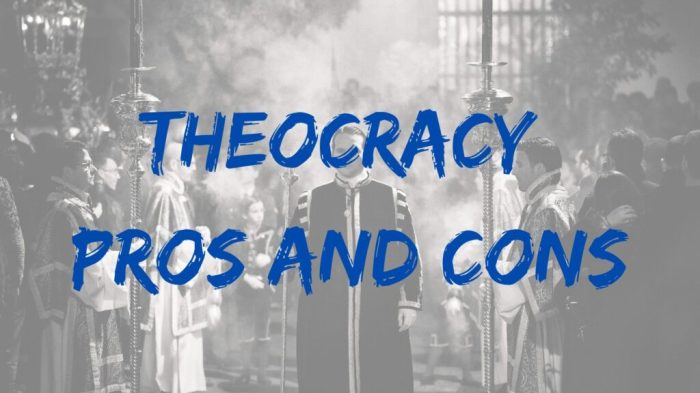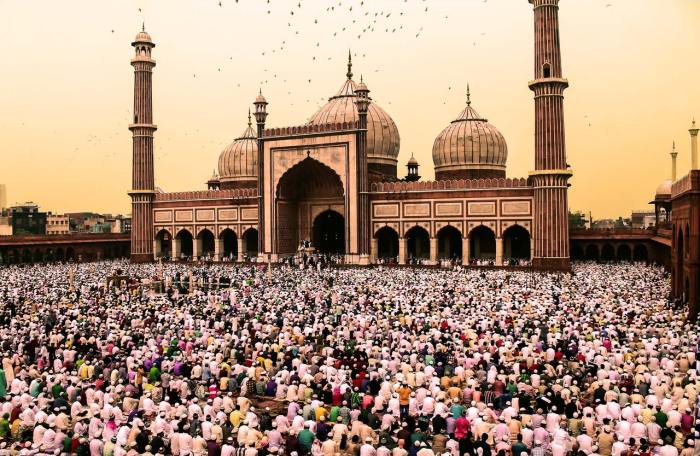Theocracy pros and cons unveils a captivating exploration into the intricate world of religious governance. Throughout history, theocracies have both inspired and challenged societies, shaping political landscapes and influencing social norms. This discourse delves into the complexities of this governance model, examining its potential benefits and drawbacks while unraveling the diverse perspectives that have shaped its evolution.
From the ancient civilizations of Egypt and Mesopotamia to modern-day Iran and Saudi Arabia, theocracies have played a pivotal role in shaping human history. This discussion delves into the historical significance of theocracy, tracing its origins and examining its impact on social and political structures.
We will also explore contemporary examples of theocratic governance, analyzing their political and social implications in the 21st century.
Pros of Theocracy

A theocracy, a government based on religious principles, offers potential benefits:
- Clear Moral Code:Theocracy provides a clear moral code that guides political decisions, potentially reducing corruption and promoting ethical behavior.
- Social Cohesion:By uniting citizens under shared religious beliefs, theocracy can foster social cohesion and a sense of community.
- Historical Success:Throughout history, theocracies such as the ancient Israelite kingdom and the medieval Islamic caliphates have demonstrated success in maintaining stability and prosperity.
Cons of Theocracy

However, theocratic governments also present drawbacks:
- Oppression and Intolerance:Theocratic regimes can lead to oppression and intolerance of those who do not adhere to the dominant religious beliefs.
- Separation of Church and State:Theocracy raises concerns about the separation of church and state, potentially leading to the erosion of individual freedoms and the suppression of dissent.
- Interpretation of Religious Texts:Different interpretations of religious texts can lead to conflicts within theocratic governments, potentially destabilizing the political system.
Types of Theocracy

Theocracies vary in their level of religious influence:
- Direct Theocracy:Religious leaders directly govern the state, holding both political and religious authority.
- Indirect Theocracy:Religious leaders influence political decisions but do not directly hold political office.
- Constitutional Theocracy:Religious principles are enshrined in the constitution, but political power is separated from religious institutions.
Historical Perspectives on Theocracy
Theocracy has played a significant role in ancient civilizations:
- Ancient Egypt:The pharaoh was considered the divine ruler, representing the god Horus.
- Ancient Mesopotamia:Theocratic city-states such as Ur and Babylon were governed by priests who held both religious and political authority.
- Medieval Europe:The Catholic Church played a dominant role in politics, influencing the decisions of kings and emperors.
Modern Examples of Theocracy

Theocracy continues to exist in contemporary times:
- Vatican City:The smallest state in the world, ruled by the Pope, the head of the Catholic Church.
- Iran:An Islamic republic where the Supreme Leader, a religious figure, holds ultimate political authority.
- Saudi Arabia:A monarchy based on the principles of Sharia law, with the king holding both political and religious power.
Quick FAQs: Theocracy Pros And Cons
What are the key benefits of theocracy?
Potential benefits include a clear moral code guiding political decisions, fostering social cohesion, and providing a sense of divine legitimacy to the government.
What are the main concerns about theocracy?
Concerns include the potential for religious oppression and intolerance, the erosion of individual freedoms, and the suppression of dissenting views.
How does theocracy impact the separation of church and state?
In a theocracy, the separation of church and state is often blurred or non-existent, leading to the intermingling of religious and political authority.
What are some historical examples of theocracy?
Historical examples include ancient Egypt, medieval Europe, and the Islamic caliphates.
What are some modern examples of theocracy?
Modern examples include Iran, Saudi Arabia, and the Vatican City.
